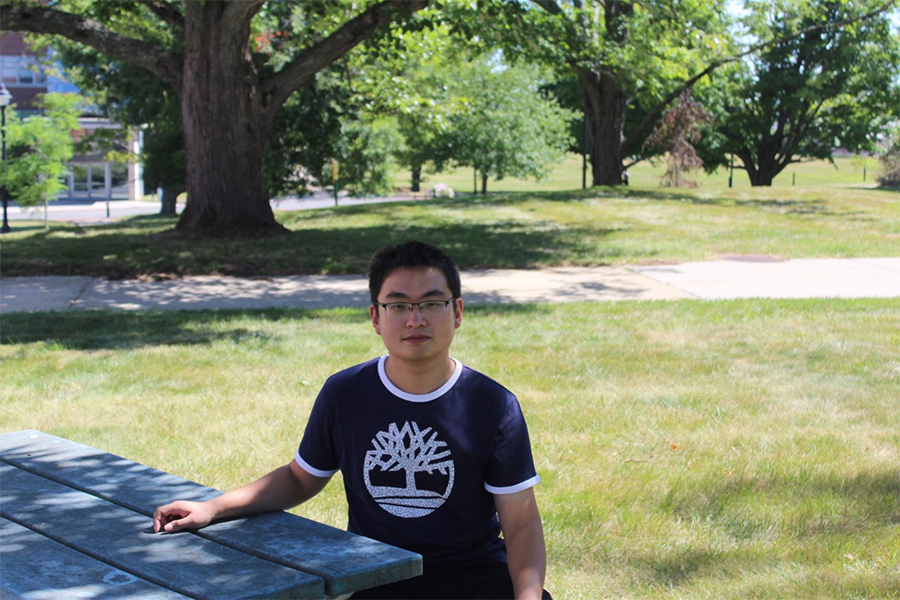This article originally appeared on Naturally@UConn.
Zhenshan Chen is a Ph.D. candidate in the Department of Agricultural and Resource Economics (ARE). After receiving his BS in physics from Sun-Yat Zen University and an MS in economics from Ocean University, both in China, Chen came to UConn in 2014. His primary area of interest is environmental economics; he enjoys studying policy evaluation, nonmarket valuation on flood risk, land use and fishery issues. A related area of interest is applied econometrics, which uses statistical methods to find relationships between economic variables.
The Department of Agricultural and Resource Economics offers a wide variety of courses in which students apply economic theory to real-world issues. Chen chose ARE based on the multidisciplinary nature of the program as well as the opportunity to do research based on real-world issues that will have lasting effects on agriculture.
Says Chen, “The doctoral program allows me to have more interaction with practitioners and people involved in those issues, instead of just facing the data and trying to come up with a question which may or may not make sense in the real world.” He says that in working with practitioners, such as town planners and project coordinators, he is able to verify the accuracy of information.
Chen’s life in China also influenced his decision to study agricultural and resource economics. “In China, the environment is a big issue and I feel there’s little attention in researching socioeconomic aspects of it.” At UConn, he has been able to study how individuals value environmental goods and the impacts of environmental policies.
Chen has worked on a several research projects in the department. One, a land-use related project with Associate Professor Charles Towe, concerned the effects of tax policies on recreational farming in upstate New York. For another project, Chen worked with Professor Stephen Swallow to evaluate the consumer response to different coastal protection plans in Virginia.
Currently, Chen is working on a project with Towe related to flood-risk management in Connecticut. Says Chen, “We’re studying the impact of flood risk on the Connecticut coastal housing market and how risk-mitigation policies influence individual homeowners.” Studying how tax revenues and the housing market respond to flood risk will help predict the economic repercussions of climate change. Understanding the long-term effects of a warming climate is essential to the continued viability of the housing market in coastal states like Connecticut. The FEMA-funded project started in 2019.
Towe, Chen and their collaborators concluded that FEMA’s flood insurance price discounts were more important to homeowners with mortgages, as mortgage lenders require flood insurance. Homeowners without mortgages were less likely to purchase flood insurance. “The interpretation could be that owners of mortgaged properties buy flood insurance primarily because they’re required to rather than a perception of risk.” says Chen.
To look more closely into this relationship, the researchers simulated raising the future property value of homes at high risk of flood. “If you think about the different flood risk policies, sea-level rise and demand-supply shift, you really don’t get an idea of how the property values evolve generally,” says Chen. The simulation predicted the change in property values based on set parameters from previous studies and assumption of property values.
Data analysis was Chen’s favorite part of this project because, he says, it was almost like solving a puzzle. He had to sift through a messy dataset to discover the links between variables. Chen also enjoys the collaborative nature of his work; he finds working with other students and faculty to be an enriching experience. “You get a lot of positive feedback and learn a lot from the interaction of ideas,” says Chen. Their final report is finished and awaiting submission and publication.
Although the research process is rewarding, Chen finds some parts more exciting than others. He shares that for him the most challenging part of the research process is data collection and data cleaning, which can be time consuming and sometimes frustrating. Says Chen, “It’s important to gather the correct data so that there are no errors later in the analysis.”
Even this early in his career, Chen has made significant contributions to research in his department. He chose to study at UConn particularly because of the university’s focus on research for the public good. And, he says, “I found UConn had so many nice people and such a great team working in the fields that I’m interested in.”
After completing his Ph.D. graduating, Chen plans to continue on the path of research. Aside from academics, Chen would like to travel to Europe as well as create his own video gaming YouTube channel.



